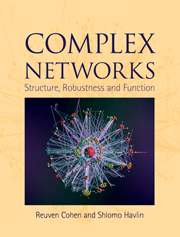Book contents
- Frontmatter
- Contents
- 1 Introduction
- PART I RANDOM NETWORK MODELS
- PART II STRUCTURE AND ROBUSTNESS OF COMPLEX NETWORKS
- PART III NETWORK FUNCTION: DYNAMICS AND APPLICATIONS
- Appendix A Probability theoretical methods
- Appendix B Asymptotics and orders of magnitude
- Appendix C Algorithms for network simulation and investigation
- References
- Index
Appendix C - Algorithms for network simulation and investigation
Published online by Cambridge University Press: 05 August 2013
- Frontmatter
- Contents
- 1 Introduction
- PART I RANDOM NETWORK MODELS
- PART II STRUCTURE AND ROBUSTNESS OF COMPLEX NETWORKS
- PART III NETWORK FUNCTION: DYNAMICS AND APPLICATIONS
- Appendix A Probability theoretical methods
- Appendix B Asymptotics and orders of magnitude
- Appendix C Algorithms for network simulation and investigation
- References
- Index
Summary
In this appendix we present efficient methods for simulating the networks discussed in the book and some efficient algorithms for analyzing their structure.
Simulation of generalized random graphs
To simulate general networks we have used the following algorithm.
(i) For each node choose a degree from the required distribution.
(ii) Create a list where each node is repeated as many times as the chosen degree.
(iii) Randomly choose pairs from the list and connect the chosen nodes (by storing for each node a list of neighbors, and adding each of the selected nodes node to the list of neighbors of the other node). Remove the chosen pair from the list (by replacing them with the last two entries in the list).
Double- and self-edges are ignored and if the number of entries in the list is odd (overall odd number of connections) one entry can also be discarded. This has aminor influence on the degree distribution if the network is large. Another possibility is to discard cases in which the sum of degrees is odd, and to rechoose the matching in case of a self loop or double-edge. Justification for the use of this algorithm for simulation and analysis as an algorithm generating the probability space of generalized random graphs can be found in [Bol80].
Information
- Type
- Chapter
- Information
- Complex NetworksStructure, Robustness and Function, pp. 215 - 221Publisher: Cambridge University PressPrint publication year: 2010
